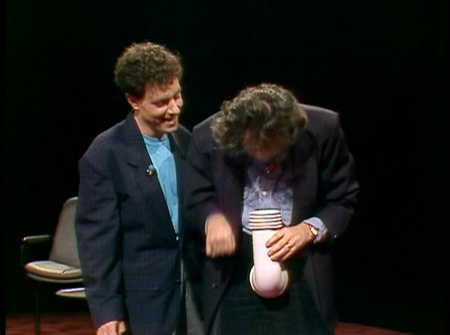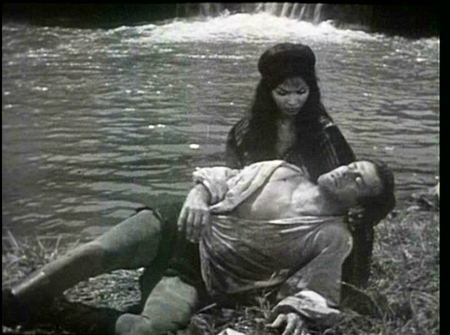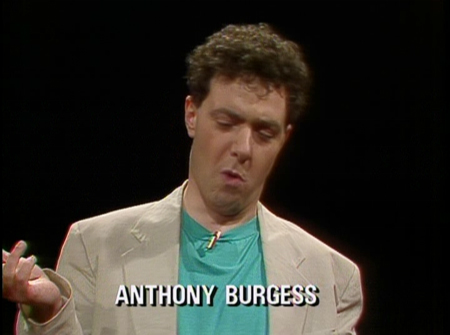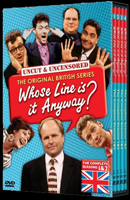BUY IT AT AMAZON: CLICK HERE!
STUDIO: A&E TV
MSRP: $49.95
RATED: NR
RUNNING TIME: 12 hours, 42 minutes
SPECIAL FEATURES:
• Behind-the-scenes featurette
The Pitch
"Back
in the dark ages, there was this tiny spark called ‘improv.’ We fed that spark
with our sweat, our labor, our very blood, and, lo, it became a moderately
successful television show. In the
The Humans
Clive
Anderson as the host, with participation from John Sessions, Josie Lawrence,
Tony Slattery, Greg Proops, Ryan Stiles, and more.
The Nutshell
Before
there was Drew Carey and ABC’s version of Whose Line Is It Anyway?, indeed
before there was a game called "Hoe-down," there was this British
comedy series that grew from a radio show of the same name. That radio show was
hosted by Clive Anderson, and had Stephen Fry (V for Vendetta) and John
Sessions as regular players. In the TV version, Stephen Fry bowed out, making
way for a host of other British comedians and, occasionally, whoever happened
to be wandering by the BBC offices.
Basically,
prompts from the audience and ridiculous propositions from the host force the
players to improvise humorous scenes, with no reward other than the sheer joy
of it.

What unholy combination of fetishes has led us to this place?
The Lowdown
This set
of four discs starts you off at the very beginning of the show’s televised
life. I mean the very beginning. The
pilot episode, included on the first disc, is embarrassingly awful, even for
the eighties. Clive Anderson knows no comfort in front of the camera, and the
audience plainly has no idea why they ought to be entertained, or who those
nice people on the stage are.
As
players, audience, and host become more comfortable in their surroundings, the
show taxis toward the runway. For the most part, it’s indistinguishable from
the American version that Mr. Carey helped shoot into the near-limelight,
except for the funny accents. There are moments, though, when you have to sit
back and think, "Are the British really that much smarter than us?"
For example, each show in this set leads off with a game called
"Authors." In this game, the four players come prepared with an
author whose voice they are going to act in. The audience provides an outrageous
title for a book, which the "authors" then describe or narrate in
their own voices. You get combinations like the author of The Joy of Sex leading
into Robert Louis Stevenson.

If I say anything here, I’m redundant.
It’s a
wonderful way to start each episode, mostly because John Sessions is such a
terrific improviser. Over the course of a couple of discs you’ll see him as
James Joyce, William Faulkner, and Friedrich Nietzsche. Would I like to open
myself up to petulant letters from sensitive folks when I make the claim that
American audiences would not, under any circumstances, comprehend this kind of
humor? You bet! When a game comes to a conclusion with a humorous parallel to Ulysses,
it’s safe to say American audiences aren’t going to keep up.
Ah, but
that’s just the tip of the elitist wankery I could draw out of some of the
performances in this set. I’d be pretty ignorant if I bothered to. While some
topics like the above are worth considering as curiosities, they don’t lend
much to enjoyment or analysis the show itself.
No single
episode really contains a string of games that hit all the right funny-bones;
most are hit-and-miss. These are the "uncut and uncensored" versions
of the show, though, which means that there’s some filth here and there to
spice things up. For example, I’m eternally grateful for Tony Slattery for the
following line, which surely would have been edited going out on ABC:
"Would you like to gasp at my veiny bangstick?"

Meet the inestimable John Sessions. Er.
The
spontaneity of improv comedy opens doors for some of the most pointed satire,
as well as the crudest of the crude. Unfortunately, what comes out is entirely
dependent on the comedians involved. With a rotating cast of dubious quality
(at least until some of the regulars settle down; and John Sessions is great in
every last show) the comedy is about as uneven as the production values of the
show. It gets better along the way, for the idle viewer as well as the alert.
The Package
One of
the discs has an interview segment with showrunners Dan Patterson and Mark
Leveson, whose names you may have heard many a time read out during the credits
portion of the show. They talk about the show’s history and guide you through a
bit of behind-the-scenes stuff. It’s not a very strong showing, as bonuses go.
6.5 out of 10
